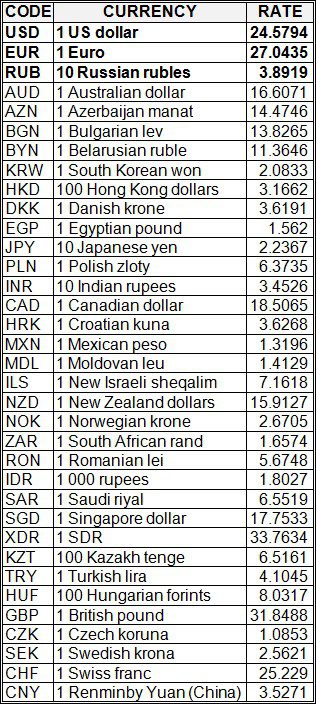National bank of ukraine’s official rates as of 07/02/20

Source: National Bank of Ukraine

KAN Development (Kyiv) is designing two projects of gated residential communities in Kyiv, which will have a house for rental, the founder of the company, Ihor Nikonov, has said. “We have acquired two land parcels for projects of gated residential communities. We are currently developing them. However, we cannot predict whether there will be demand. We just have to take and make a new product on the market: housing in private houses within the city. I’ll say right ow this will not be townhouses – they did not take root in our market,” he said in an exclusive interview with Interfax-Ukraine.
According to him, the land area is approximately 30 hectares. Both projects are designed for 160-200 houses. Infrastructure will include a kindergarten with an elementary school, a kids club, a restaurant, and a swimming pool.
“We are trying to make a rental house under the project, where one can rent apartments for staff or relatives who have come to stay. All these are attributes of a comfortable life. I personally try to develop the concept of life without a car. It will be our goal in new projects. To live constantly on wheels is absolutely uncomfortable and inefficient,” the founder of KAN Development said.
As he said, currently there are no offers of gated residential communities in the Kyiv’s market, all projects in this segment are being implemented in the suburbs.
In addition, he said that in 2020, KAN Development plans to launch a new business-class complex project in the center of Kyiv.
“We still plan to diversify the risks and carry out several projects of different categories at the same time. This year, I think, we will launch three projects. We have begun a comprehensive business class development project in the center of Kyiv. I think that we will bring it to the market in 2020,” he said.

PJSC Donbasenergo transferred UAH 68.5 million of taxes and other obligatory payments to the national and local budgets, which is 2.7 times (by UAH 43.1 million) more than in January 2019. According to the company’s press release, UAH 67.7 million was transferred to the national budget (VAT, environmental tax, fees for a special use of water resources, other taxes of the national level), and UAH 800,000 (land tax, immovable property tax, etc.) were paid to the local budget of Donetsk region.
Donbasenergo owns Starobesheve (located in the occupied territory) and Sloviansk thermal power plants (TPP) with the total installed capacity of 2,880 MW, in particular the capacity of Sloviansk TPP is 880 MW. At the end of March 2017, the generation company announced the loss of control over the operation of Starobesheve TPP, as well as part of structural units located in the temporarily uncontrolled territory.
PrJSC Energoinvest Holding owns 60.86% of the shares of Donbasenergo, another 25% of the shares of the generating company are owned by the state

Oil transit through Ukraine to European countries in January 2020 decreased by 3.6% (by 40,000 tonnes) compared to the same period in 2019, to 1.057 million tonnes, JSC Ukrtransnafta has reported. The volume of oil transportation to oil refineries in the country in January 2020 amounted to 188,500 tonnes, which is 16% (26,100 tonnes) more than in January 2019.
Thus, in January 2020, the share of transit volume in the total transportation of oil (1.246 million tonnes) was 84.9%, the share of pumping to the country’s refineries was 15.1%.

On February, 8 and 9 in Ancient Kyiv in the Principality of Kyivan Rus («Kyivan Rus Park») an interactive entertaining program «Sky Horses» will take place. Horse-trick performances, master-classes on ancient martial arts and horse care, tasty dishes prepared on fire, Slavic games, and round dances will be waiting for the guests … And all of this in a real, live medieval city!
Ancient Kyiv opens at 10:00. The program starts at 13:30.
The ticket price: a full adult ticket – 190 UAH, for pensioners and students – 150 UAH, for schoolchildren – 80 UAH, for preschool children – for free.
Ancient Kyiv in the «Kyivan Rus Park» is located in the vill. Kopachiv, Obukhiv district, Kyiv region.
Route taxis leave from Kyiv from the «Vydybitchi» metro station.
Detailed information on the website www.parkkyivrus.com
The Interfax subscribers can save money with the “openbusiness-20” promo code for a 20%-discount for a full price adult ticket to the Principality of Kyivan Rus:
– by previous order by tel.: +38 044 461-99-37, +38 050 385-20-35
– or at the cash desk at the entrance to the «Kyivan Rus Park».